Programming exercises
- 2. Who am I? 2
- 4. 4
- 7. Question Does software company need to train programmers? 7
- 10. ProjectEuler.net "Project Euler exists to encourage, challenge, and develop the skills and enjoyment of anyone with an interest in the fascinating world of mathematics." ? Project Euler is a series of challenging mathematical/computer programming problems that requires more than just mathematical insights to solve. 10
- 13. Expectations Mathematics lution implementing So rfor mance co d ing Hig h pe So lving problem ind ivi dually 13
- 14. Example: Quick & Dirty Once you solved a problem, you are entitled to join the forum for this problem.You can share your solution with the other people who have also solved it. And the post usually start with this sentence:! Good coding habit? 14
- 16. int i, j, k, n, sum;! int factorial[10000];! " ? ItˇŻs too simple for ? ? Java, Ruby or Python, for which they can handle big numbers by default." So letˇŻs look at C/C++." Real code copied from the forum. int* getfactorial(int n)! {! factorial[0] = 1;! k = 0;! for(i = 2; i <= n; i++)! {! for(j = 0; j <= k; j++)! factorial[j] *= i;! for(j = 0; j <= k; j++)! {! if(factorial[j] >= 10)! {! factorial[j+1] += (factorial[j] - (factorial[j] % 10)) / 10;! factorial[j] = factorial[j] % 10;! if(j == k)! k++;! }! }! }! return factorial;! }! " int getsum(int* array, int k)! {! sum = 0;! for(i = 0; i <= k; i++)! sum += array[i];! return sum;! }! " int main()! {! int* factorial = getfactorial(n);! sum = getsum(factorial, k);! cout << "nThe sum of the digits of " << n << "! is " << sum << ".n";! return 0;! 16 }!
- 17. 17
- 18. Big number again. Ha ha, I did that before! Let me reuse it... 18
- 19. #include<iostream>! " using namespace std;! " int i, j, k, n, sum;! int factorial[10000];! " Why the big number is named ˇ®factorialˇŻ in my previous implementation? int* getfactorial(int n)! {! factorial[0] = 1;! k = 0;! for(i = 2; i <= n; i++)! {! for(j = 0; j <= k; j++)! factorial[j] *= i;! for(j = 0; j <= k; j++)! {! if(factorial[j] >= 10)! {! factorial[j+1] += (factorial[j] - (factorial[j] % 10)) / 10;! factorial[j] = factorial[j] % 10;! if(j == k)! k++;! }! }! }! return factorial;! } WhereˇŻs the code for big number? 19
- 20. #include <stdio.h> " #define NUMB 120 #define SIZE 1000000000 " OK, too hard to reuse. ItˇŻs not that hard to invent the wheel again. // 9 * 120 = 1080 total digits. // 9 digit numbers int main() { int i = 0; int j = 0; int bigNum1[NUMB]; int bigNum2[NUMB]; int bigNum3[NUMB]; int counter = 0; " " " " } for (i = 0; bigNum1 = bigNum2 = bigNum3 = } i < NUMB; i++) { 0; 0; 0; bigNum1[0] = 1; bigNum2[0] = 1; counter = 2; i = 0; while (i == 0) { counter++; for (j = 0; j < NUMB; j++) { bigNum3[j] = bigNum2[j] + bigNum1[j]; } for (j = 0; j < NUMB-1; j++) { while (bigNum3[j] >= SIZE) { bigNum3[j] -= SIZE; bigNum3[j+1]++; } } if (bigNum3[111] >= 1) break; for (j = 0; j < NUMB; j++) { bigNum1[j] = bigNum2[j]; bigNum2[j] = bigNum3[j]; } } printf("n"); printf("P025 answer = %u", counter); 20
- 21. s ng exercise i oblem so lv Pr tant skills ver y impor ? Train inter view s ten use d a Of ? ques tions n skills in i ly also tra ? Probab able co de, n ng maintai maki a little. ?DonˇŻt do it before bed time... 21
- 22. What is Cyber Dojo? 22
- 23. 23
- 24. 24
- 25. 25
- 26. RED - GREEN - REFACTOR 26
- 27. Functional Test Integration Test Unit Test 27
- 28. 28
- 29. 29
- 30. 30
- 32. Code Retreat A day-long practice-intensive event for programmers, ! popularized by Corey Haines. ? ? ? ? ? ? ? 32
- 33. Which One Do You Prefer? 33
- 34. Poker Hands 34
- 36. Poker Hands in ProjectEuler ? This is not a very hard problem to solve, ? comparing to most of the problems listed in ProjectEuler.net" But itˇŻs hard to solve it without bugs if you donˇŻt have unit tests." ? Problem 54 in projectEuler.net 36
- 38. Why Did I Do It Right With Only One Try? 38
- 39. TEST(poker_hand, comparing){ CHECK(pokerHand("4H 5C 6S 7S TD")< pokerHand("2C 3S 7S 8D KD")); CHECK(!(pokerHand("4H 5C 6S 7S KD")< pokerHand("2C 3S 7S 8D TD"))); CHECK(pokerHand("4H 5C 6S 7S KD")> pokerHand("2C 3S 7S 8D TD")); } TEST(poker_hand, compare_cards){ CHECK(pokerHand("3H 5C 6S 7S 8D")< pokerHand("4H 5C 6S 7S 9D")); CHECK(pokerHand("3H 5C 6S 7S 9D")< pokerHand("4H 5C 6S 7S TD")); CHECK(pokerHand("3H 5C 6S 7S TD")< pokerHand("4H 5C 6S 7S JD")); CHECK(pokerHand("3H 5C 6S 7S JD")< pokerHand("4H 5C 6S 7S QD")); CHECK(pokerHand("3H 5C 6S 7S QD")< pokerHand("4H 5C 6S 7S KD")); CHECK(pokerHand("3H 5C 6S 7S KD")< pokerHand("4H 5C 6S 7S AD")); } TEST(poker_hand, compare_high_cards_2nd){ CHECK(pokerHand("3H 5C 6S 7S 9D")< pokerHand("3H 5C 6S 8S 9D")); } TEST(poker_hand, compare_high_cards_3nd_4th_5th){ CHECK(pokerHand("3H 5C 6S 8S 9D")< pokerHand("3H 5C 7S 8S 9D")); CHECK(pokerHand("3H 4C 7S 8S 9D")< pokerHand("3H 5C 7S 8S 9D")); CHECK(pokerHand("2H 5C 7S 8S 9D")< pokerHand("3H 5C 7S 8S 9D")); } TEST(poker_hand, compare_high_card_and_one_pair){ CHECK(pokerHand("3H 5C 6S 8S 9D")< pokerHand("3H 5C 7S 8S 8D")); } TEST(poker_hand, compare_one_pairs){ CHECK(pokerHand("3H 5C 6S 9S 9D")> pokerHand("3H 5C 7S 8S 8D")); CHECK(pokerHand("5C 6S 9S 9D KD")> pokerHand("5C 7S 8S 8D AD")); CHECK(pokerHand("5C 6S 9S 9D KD")< pokerHand("5C 7S 9S 9D AD")); } " ... 39
- 40. Do deliberate exercises. Alone and with the others. Always use good practices. Have fun. 40

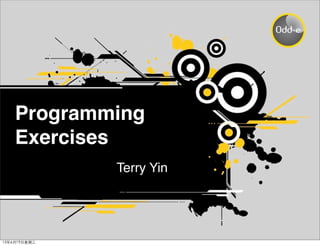
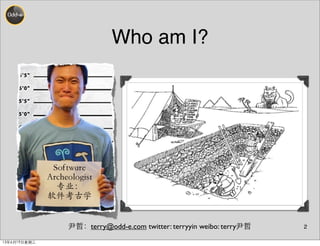






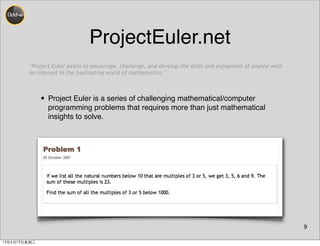
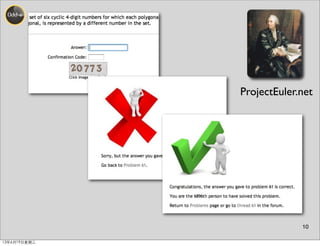
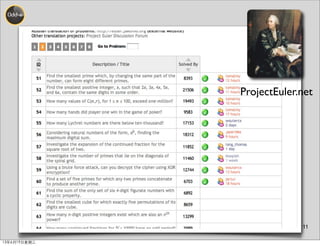



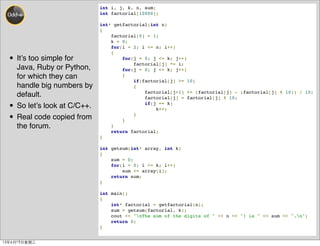
![int i, j, k, n, sum;!
int factorial[10000];!
"
? ItˇŻs too simple for
?
?
Java, Ruby or Python,
for which they can
handle big numbers by
default."
So letˇŻs look at C/C++."
Real code copied from
the forum.
int* getfactorial(int n)!
{!
factorial[0] = 1;!
k = 0;!
for(i = 2; i <= n; i++)!
{!
for(j = 0; j <= k; j++)!
factorial[j] *= i;!
for(j = 0; j <= k; j++)!
{!
if(factorial[j] >= 10)!
{!
factorial[j+1] += (factorial[j] - (factorial[j] % 10)) / 10;!
factorial[j] = factorial[j] % 10;!
if(j == k)!
k++;!
}!
}!
}!
return factorial;!
}!
"
int getsum(int* array, int k)!
{!
sum = 0;!
for(i = 0; i <= k; i++)!
sum += array[i];!
return sum;!
}!
"
int main()!
{!
int* factorial = getfactorial(n);!
sum = getsum(factorial, k);!
cout << "nThe sum of the digits of " << n << "! is " << sum << ".n";!
return 0;!
16
}!](https://image.slidesharecdn.com/programmingexercises-130619040250-phpapp01/85/Programming-exercises-16-320.jpg)


![#include<iostream>!
"
using namespace std;!
"
int i, j, k, n, sum;!
int factorial[10000];!
"
Why the big number is named ˇ®factorialˇŻ
in my previous implementation?
int* getfactorial(int n)!
{!
factorial[0] = 1;!
k = 0;!
for(i = 2; i <= n; i++)!
{!
for(j = 0; j <= k; j++)!
factorial[j] *= i;!
for(j = 0; j <= k; j++)!
{!
if(factorial[j] >= 10)!
{!
factorial[j+1] += (factorial[j] - (factorial[j] % 10)) / 10;!
factorial[j] = factorial[j] % 10;!
if(j == k)!
k++;!
}!
}!
}!
return factorial;!
}
WhereˇŻs the code for big number?
19](https://image.slidesharecdn.com/programmingexercises-130619040250-phpapp01/85/Programming-exercises-19-320.jpg)
![#include <stdio.h>
"
#define NUMB 120
#define SIZE 1000000000
"
OK, too hard to reuse. ItˇŻs not
that hard to invent the wheel again.
// 9 * 120 = 1080 total digits.
// 9 digit numbers
int main() {
int i = 0;
int j = 0;
int bigNum1[NUMB];
int bigNum2[NUMB];
int bigNum3[NUMB];
int counter = 0;
"
"
"
"
}
for (i = 0;
bigNum1 =
bigNum2 =
bigNum3 =
}
i < NUMB; i++) {
0;
0;
0;
bigNum1[0] = 1;
bigNum2[0] = 1;
counter = 2;
i = 0;
while (i == 0) {
counter++;
for (j = 0; j < NUMB; j++) {
bigNum3[j] = bigNum2[j] + bigNum1[j];
}
for (j = 0; j < NUMB-1; j++) {
while (bigNum3[j] >= SIZE) {
bigNum3[j] -= SIZE;
bigNum3[j+1]++;
}
}
if (bigNum3[111] >= 1)
break;
for (j = 0; j < NUMB; j++) {
bigNum1[j] = bigNum2[j];
bigNum2[j] = bigNum3[j];
}
}
printf("n");
printf("P025 answer = %u", counter);
20](https://image.slidesharecdn.com/programmingexercises-130619040250-phpapp01/85/Programming-exercises-20-320.jpg)



















